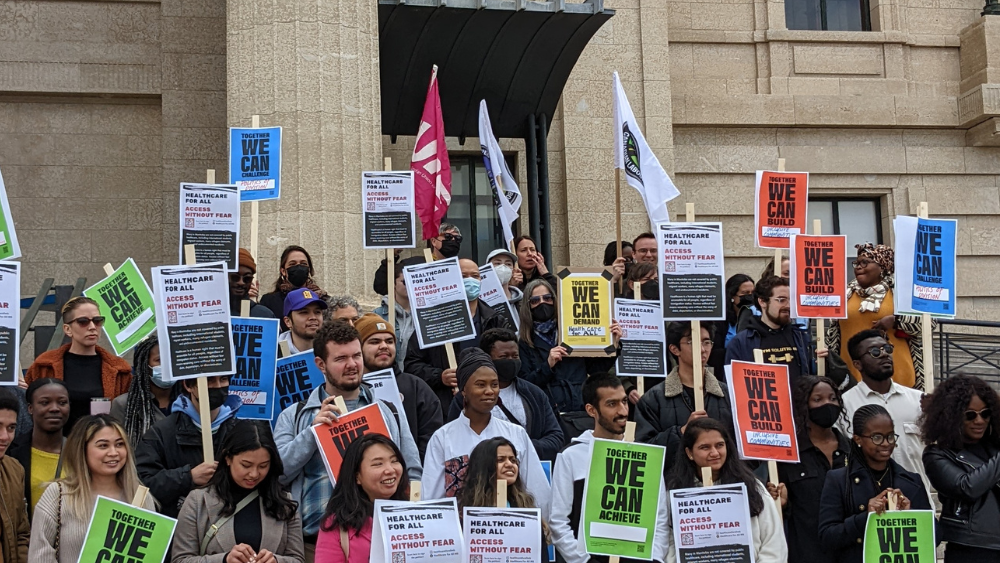International students speak out on healthcare inaccessibility in Manitoba

When the Manitoba government ended public health coverage for international students in March 2018, students fought back. Community groups have mobilized with them around the issue of healthcare access in Manitoba for students and other migrant groups who face similar barriers. New research surveying the experience of international students, by the Canadian Federation of Students, documents the negative health impacts of this short-sighted policy change.
Accessing healthcare is now expensive and stressful. Not only are students required to pay for private insurance now, but also still pay out-of-pocket medical expenses due to the private plans. As one student shared, important medical services are excluded – “I have a history of kidney and respiratory disease, but blood tests and required examinations are not covered by my private health insurance”. Other students described being denied care, or asked to pay fees they cannot afford. A defining factor characterizing their experiences with healthcare was “[n]ot having a lot of access to resources” – or care.
Reliance on private insurance plans leads to significant financial bills, deters students from accessing medical care, and creates a financial stress for both students and their families. This affects their academic and immigration trajectories and overall well-being. Private insurance options are an inadequate substitute for providing healthcare coverage for international students and are not genuine access to healthcare.
For instance, a student shared that they avoided visiting the hospital when they were ill because of the high charges – “I am always nervous to visit a doctor because I never know what it will cost me… I had COVID and I was hoping to die instead of having to rack up a hospital bill, luckily it didn’t reach to that point. Long story short, I don’t know if I can even access proper healthcare”. Another student recounted their experience with pregnancy, noting having to pay directly for prenatal appointments, tests, and ultrasounds: “There was even a night when I got violently and seriously ill, but I chose to stay at home and not go to the hospital because my coverage had not kicked in yet”.
Accessing healthcare with private insurance also represents immigration risks. Several accounts shared by international students describe hospital administration in Winnipeg engaging with border authorities (CBSA) and sharing patient information when health expenses rendered are significant and are not fully covered. If they are in a vulnerable immigration situation, international students risk personal security and residency.
Lastly is the question of equality and fairness. International students note the inequalities between themselves and domestic student peers regarding both tuition and healthcare expenses. They position healthcare as a human right, highlighting the many ways they contribute to their Manitoban communities, and connecting their healthcare status to their broader sense of belonging.
The COVID-19 pandemic exacerbated these challenges. At the height of the pandemic there were immense vaccine inequalities throughout the world as well as in Manitoba, with many individuals, including international students, experiencing barriers to vaccinations due to the lack of a provincial health card. As one student described, “One of the biggest consequences of having private health insurance is not being able to access any kind of online data or book to get a COVID-19 vaccine.” After describing being denied a vaccination, a student lamented, “I feel like a stranger without a healthcare even though I have been living in Canada for more than three years now”. Unequal access to healthcare leads to unequal access to community – both in concrete ways, such as when vaccinated students were refused entry to city spaces because were not provided with the same documentation, or in more symbolic ways linking to feelings of being a stranger and not belonging.
Feelings of belonging are strongly associated with access to the basic social and health resources of the community – the ways people in Manitoba take care of each other. Welcoming international students into communities requires more than just offering a study permit and employment. It requires recognition of their basic human rights and what they require in order to fulfill them.
There are steps that can be taken to address these challenges. Eligibility for public health insurance to international students and their families would significantly expand access and address many of the healthcare challenges highlighted by students in their advocacy. However, reinstating healthcare linked to a study permit, as it was prior to 2018, is not enough to reduce all of the healthcare inequities international students face. For students who experience a gap in their immigration status because the papers are being processed, or because they have to reduce their course load, there will continue to be healthcare accessibility challenges as they move through these processes. All students in Manitoba should be able to transfer institutions or take a reduced study load when necessary, while accessing the physical and mental healthcare they need without going into debt or going without basic essentials to pay for healthcare. In order to fully address these needs, it is necessary to implement public healthcare coverage for all people living in Manitoba, regardless of immigration status.


